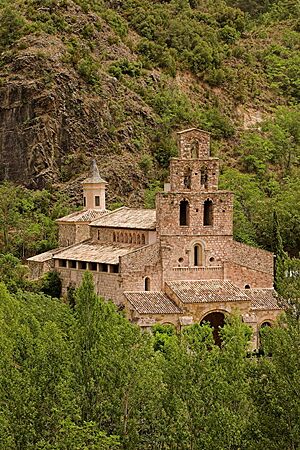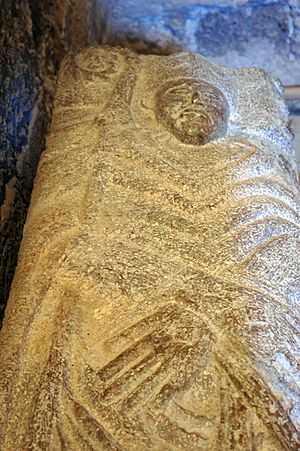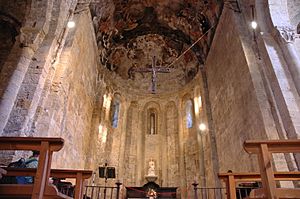Santa Maria de Gerri facts for kids
The Santa Maria de Gerri monastery is an old and important building in Gerri de la Sal, Catalonia, Spain. It's located right by the Noguera Pallaresa river. This special place has a long history and beautiful Romanesque architecture.
A Look Back in Time
The Santa Maria de Gerri monastery was started way back in the year 807. By 839, the monks living there decided to follow the Benedictine rule. This was a special set of rules for monks to live by, focusing on prayer and work.
The monastery was in an area called the Diocese of Urgell. It helped spread Christianity in this region. This land had recently been taken back by Christians from the Moors.
In 996, the Popes themselves decided to protect the monastery. It also became connected to a very important monastery in France, the Abbey of St. Victor in Marseille.
Later, in 1190, King Alfonso II of Aragon took the monastery and all its lands under his protection. Over the next two centuries, from the 12th to the 14th centuries, the monastery received many gifts and donations. One of these gifts was a cave monastery called Sant Pere de les Maleses. Because of all these gifts, Santa Maria de Gerri became the richest monastery in the County of Urgell.
However, over time, the monastery became less important. Finally, in 1835, it was closed down.
What the Monastery Looks Like
Not much is left of the original building from the 9th century. But the main church, built in the 12th century, is a great example of Romanesque architecture.
The church has a long main hall called a nave. It also has two side sections called aisles. It doesn't have a transept, which is a part that usually crosses the main hall. At the end of the church, there are three semi-circular parts called apses. These apses are in a lower area, like a special platform, compared to the rest of the church.
The main hall has a curved ceiling, known as a barrel vault. The central apse is decorated with seven "blind arcades." These are like arches that are just for decoration and don't open up. They are supported by flat columns called pilasters. These pilasters have carved tops, or capitals, that look similar to those at the Sant Pere de Galligants monastery.
You can see the same kinds of decorations all over the capitals inside the church. They show things like plants, amazing fantasy animals, angels, and characters from the Bible.
The front of the church has a tall, thin bell tower that looks a bit like a ship's sail. It has three levels for bells.
See also
 In Spanish: Monasterio de Santa María de Gerri para niños
In Spanish: Monasterio de Santa María de Gerri para niños




